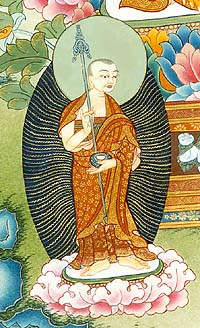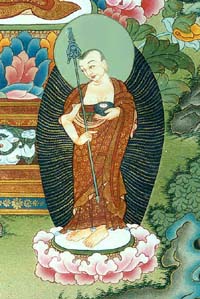how to become a monk
According to Buddhist practice, there are three stages or steps. The initial stage is to reduce attachment towards life. The second stage is the elimination of desire and attachment to this samsara. Then in the third stage, self-cherishing is eliminated
–HH Dalai Lama
Becoming a Buddhist monk or nun is truly a meaningful and worthwhile way to spend your life, and to be of benefit to others. We are very fortunate that the monastic tradition started by the Buddha is still alive today, thanks to the devotion, dedication and efforts of many thousands of monks and nuns in Asia over the last 2500 years. Although there is great benefit in becoming ordained, the life of a Buddhist monk or nun also carries a deep responsibility for oneself and for others.

Knowing the Buddhist Teachings
Before making the decision to take ordination, one should have a thorough foundation in the teachings of the Buddha, such as the Four Noble Truths, the Eightfold Path, and the Stages of the Path to Enlightenment (lam-rim). Traditionally a student requesting ordination has completed several years of study and practice under the guidance of a qualified teacher. If you are beginning, check your local area for a center or study group where you can generate an understanding of the teachings, gather the support of other dharma students and have the guidance of a qualified teacher.
Having a Spiritual Guide
In any venture we undertake, we need someone who can teach and guide us. This is especially true in our spiritual journey where a qualified teacher can provide the guidance we need to be successful in our practice. Our teacher can help provide the foundation for the monastic life, and will understand when we are ready to take on the commitment required for the monastic vows of ordination. You need to have a teacher who can give you permission to be ordained
Entering the Buddhist Path
Take the time you need in developing your spiritual practice. Once one understands the value of the Buddha's teachings and feels they are appropriate for one's own spiritual development, the next step is to formally establish yourself as a Buddhist by taking "refuge".
It is also important to strengthen one's practice by taking "lay vows" preparing one for living with vows; many students will also practice celibacy for a period prior to taking ordination. Know yourself and know whether you will feel comfortable being a monk or nun.
Considering Ordination
If possible spend some time living in a monastic community receiving advice from the resident monks or nuns on what it is like to be a monastic. Discuss with monks and nuns who have lived with the vows and can offer very practical information on how to maintain one's commitment. Members of the monastic community are happy that you are interested in following the monastic path and want to support you in your ordination. Resources and articles are also available online.
Programs are being developed where lay practitioners considering ordination can gain an understanding and experience of the monastic life in protected retreat environment.
A Lifelong Commitment
The vows of a Buddhist monk or nun are taken for life, therefore it is important to spend time and take great care in reflecting on the various advantages and disadvantages before making a decision. Some monasteries in Asia (e.g. in Thailand) offer part-time ordination programs, usually for men, which allow one the possibility to live as a monastic for a few days, weeks, months, or years. However, in the Tibetan tradition, one makes a commitment for life. And although there are cases of people who take vows and later give them back and return to lay life, this is not recommended. The vows are taken with the determination to keep them for the rest of one's life.

Being Part of a Community
Becoming a Buddhist monastic means that you are joining a community—the Sangha. The purpose of the community is to study and practice the Buddha's teachings, and whenever possible, to share them with others. Traditionally, one stays in a monastic community for at least 5 years after becoming ordained. However, as monastic communities are still in development in many parts of the world, this is not always possible. In some cases, one can also reside within a dharma center under the guidance and protection of one's teachers. One should investigate the possibilities that are available to join monastic communities prior to ordination.
Living in community also means that we share our resources, our habits, our practice and our personalities. In learning to live in a community one can face many difficulties, particularly as many of us have been raised in cultures of individual expression. In order to protect our ordination, the vinaya (code of conduct) for monastic life is very explicit in how we live in community.
Supporting Yourself
Traditionally, when one joins a monastic community, the four basic requisites of food, clothing, dwelling and medicine are provided. However, as Buddhism is relatively new to many parts of the world, resources to support the monastic communities are limited. For those considering ordination, it is important to consider what resources are available for support once one has taken ordination. Many monks and nuns provide service to their local dharma communities in exchange for their basic needs. The International Mahayana Institute also provides support in dependence on available resources. It is contrary to the Vinaya (code of conduct) for monks and nuns to work in worldly jobs to support themselves. Those seeking to become monks or nuns should discuss their situation with their teacher or senior Sangha to ensure their stability once they have taken ordination.
These points should give you a better idea of the realities – and challenges! – of living as a Buddhist monastic.
Taking it Further
- The International Mahayana Institute (IMI), FPMT's community of monks and nuns has more detailed guidelines and next steps.
- Lama Yeshe Wisdom Archive has compiled talks given by Lama Thubten Yeshe and Lama Zopa Rinpoche on Advice for Monks And Nuns
- Additionally, Nalanda Monastery has compiled some very helpful material to read while considering ordination
- There is an excellent booklet by Ven. Thubten Chodron which you may find helpful. Preparing for ordination: Reflections for Westerners Considering Monastic Ordination in the Tibetan Buddhist Tradition. For copies contact Dharma Friendship Foundation PO Box 30011 Seattle, WA 98103, USA
- Pre Ordination Course held annually at Tushita Retreat Center

how to become a monk
Source: https://fpmt.org/centers/sangha/firstletter/
Posted by: montanodrationotled.blogspot.com

0 Response to "how to become a monk"
Post a Comment